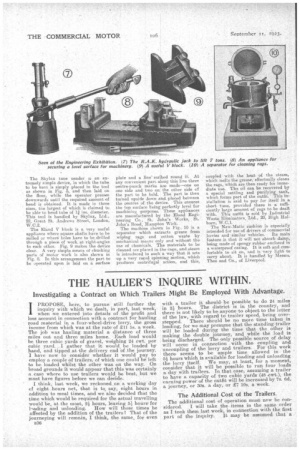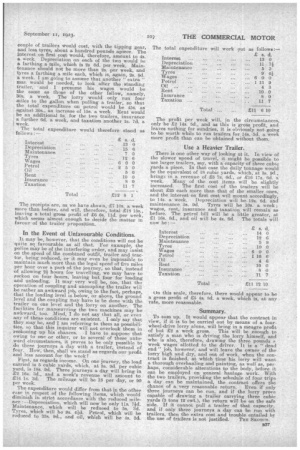THE HAULIER'S INQUIRE WITHIN.
Page 22

Page 23

If you've noticed an error in this article please click here to report it so we can fix it.
Investigating a Contract on Which Trailers Might Be Employed With Advantage.
IPROPOSE, here, to pursue still further the inquiry with which we dealt, in part, last week, when 'we entered into details of the profit and loss account in connection with a contract for hauling road material in a four-wheel-drive lorry, the gross income from which was at the rate. of R11 5s. a week. The job was hauling material a distance of three miles out and three, miles home. Each load would be three cubic yards of gravel, weighing 24 cwt. per cubic yard. _ I gather that it would be loaded by hand, and tipped at the delivery end Of the journey. I have now to consider whether it would pay to employ a couple of trailers, of which one could be left to be loaded whilst the other was on the way. On broad grounds it would appear that this was certainly a case where to use trailers would be best, but we must have figures before we can decide.
I think, last week, we reckoned on a working day of eight hours net, that is to say, eight hours in addition to meal times, and we also decided that the time which would be required for the actual travelling would be, at the most, 2i hours, leaving 51 hours for bading and unloading. How will those times be affected by the addition of the trailers? That of the journeying will remain, I think, the same, for even
B36
with a trailer it shouldbe possible to do 24 miles in q hours. The district is in the country, and there is n'ot likely to be anyone to object to the letter of the law, with regard to trailer speed, being overstepped. There should be no more time taken in loading, for we may presume that the standing trailer will be loaded during the time that the other is making the double journey, and while the load is being discharged. The only possible source of delay will oecum in connection with the coupling and uncoupling of the lorry and trailers. For this work there seems to be ample time allowed in the 5i hours which is available for loading and unloading the lorry itself. We may, at least, for a moment, consider that it will be possible to run four loads a day with trailers. In that case, assuming a trailer to have a. capacity of two cubic yards (48 'cwt.), the earning power of the outfit will be increased by 7s. 6d. a journey, or 30s. a day, or £7 10s. a week.
The Additional Cost of the Trailers.
The additional cost of operation must now be considered. I will take the items in the same order as I took them last week, in connection with the first part of the inquiry. It may be assumed that a couple of trailers would cost, with the tipping gear, and less tyres, about a hundred pounds apiece. The interest on first cost would, therefore, amount to 4s. a -week. Depreciation on each of the two would be a farthing a mile, which is 2s 6d. per week. Maintenance should not be more than 2s. per week, and tyres a farthing a mile each, which is, again, 2s. 6d. a week. I am going to assume that another " extra " man would be needed, to look after the standing trailer, and I presume his wages would be the same a.s those of the other tellaw, namely, 30s. a week. The lorry would only run four miles to the gallon. when pulling a trailer, so that the total expenditure on petrol would be 45s. as against 30s., an increase of 155. a week. Rent would be •an additional 5s, for the two trailers, insurance a further 6d. a week, and taxation another, Is. id. a week.
The total 'expenditure would therefore stand as follows : E s. d.
Interest ... 13 0 Depreciation 15 6 Maintenance 70 Tyres 12 6 Wages 6 0 0
Petrol 2 5 0
Oil 56 Rent 10 0 Insurance 80 Taxation 11 7 Total ... 212 8 1 The receipts are, as we have shown, 27 10s. a week more than before, and will, therefore, total 218 15s., leaving a total gross profit of 2.6 6s. Ild, per week, which seems almost enough to decide the matter in favour of the trailer proposition.
In the Event of Unfavourable Conditions.
It may be, however, that the conditions will not be quite so, favourable as all that. For example, the police' may be of the interfering order, and may insist on the speed of the combined outfit, trailer and tractor, being reduced, or it may even be impossible to maintain much more than the legal speed of five miles per hour over a part of the journey, so that, instead of allowing 21 hours for travelling, we may have to reckon on four hours, leaving but four for loading and unloading. It may very well be, too, that the operation of coupling and uncoupling the trailer will be rather an awkward job, owing to the fact, perhaps, that the loading level is below, or above, the ground level and the coupling may have to be done with the trailer on one level and the lorry on another. The facilities for manceuvring the two machines may be awkward, too. Mind, I do not say that all, or even any of these conditions are existent. I only say that they may be, and I am referring to them as possibilities, so that this inquirer will not overlook them in reckoning up his chances. I have to suppose that owing to one or other, or to several of these untoward circumstances, it proves to be only possible to de three journeys a day with a trailer, instead of four. Raw, then, shall we stand as regards our profit and loss account for the week?
First, as regards income. On one journey, the load carried is 5 cubic yards, which, at 3s. 9d. per cubic yard, is 18s. 9d. Three journeys a day will bring in 22 16s. 3d., and a week's revenue will amount to 214 Is. 3d. The mileage will be 18 per day, or 90 per week.
The expenditure would differ from that in the other ease in respect of the fallowing items, which would diminish in strict accordance with the reduced milearia :-Depreciation, which will now be only his. Id. Maintenance, which will be reduced to 5s, 3d. Tyres, which will be 9s. 41d. Petrol, which will be reduced to 33s. 9d., and oil, which will be 4s. 3d.
The total expenditure will work put as follows: 2 s. d.
Interest.. 13 0
Depreciation 11 71,
Maintenance 5 3 Tyres . ... 9. 41 Wages •... 6 0 0 Petrol 1 13 9 Oil ... a. 4 3 .
Rent 10 0 Insurance 8 0 ' Taxation . 11 7 Total Ell 6 10 The profit per week will, in the circumstances, only be 2.2 14s. 5d., and as this is gross profit, and leaves nothing for sundries, it is obviously not going to be worth while to run trailers for 14sa5d. a week more profit than can be obtained without them.
Use a Heavier Trailer.
There is one other way of looking at it. In view of the slower speed of travel, it might be possible to use larger trailers, say, with a capacity of three cubic yards a piece. In that case the daily tonnage would be the equivalent of .18 cubic yards, which, at 3s. 9(1., brings in a revenue of 23 7s. 6d., or 216 17s. 6d. a
week. Many of the cost items will be slightly
increased. The first cost of the trailers will be about 225 each more than that of the smaller ones, and the interest on first -cost will mount accordingly,
to 14s. a week. Depreciation will be 12s. 6d. and maintenance 5s. 9d. Tyres will be 10s. a week ; wages, rent, insurance and taxation will remain as before. The petrol bill will be a little greater, at 21 16s. 6d., and oil will be 4s. 6d. The totals will now be : 2 s. d.
Interest ... 14 Depreciation 12 6 Maintenance 5 9 Tyres 10 0 Wages 60 0 Petrol 1 16 6
Oil ... 4 6
Rent10 0 Insurance 8 0 Taxation ... 11 7
Total ... EU 12 10 On this scale, therefore, there would appear to be a gross profit of 25 4s. ad. a week, which is, at any rate, more reasonable.
Summary.
To sum up. It would appear that the contract in view, if it is to be carried out, by means of a fourwheel-drive lorry alone, will bring in a meagre profit of but 22 a week gross. This will be enough to satisfy a man who is driving the lorry himself, and who is also, therefore, drawing the three pounds a week wages allotted to the driver. It is a "dead end" job, however, and will leave the owner of the lorry high and dry, and out of work, when the contract is finished, at which time his lorry will want a thorough overhauling and painting, as well as, per haps, considerable alterations to the body, before it can be employed on general haulage work. With the two trailers, providing the schedule of four trips a. day can be maintained, the contract offers the chance of a. very reasonable return. Even if only three journeys can be run, and if the lorry prove capable of drawing a. trailer carrying three cubic yards (3 tons 12 cwt.), the return will be on the safe side. If it cannot pull a trailer of that capacity. and if only three journeys a day can be run with trailers, then the extra cost and trouble entailed by the use of trailers is not justified. THE SHOTCH.


































